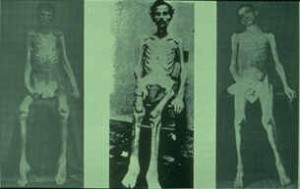Young Americans need to (and want to) learn the rules of war
[Article by Mat Morgan. Re-posted from blog.redcross.org because today is the 150th anniversary of the first shot fired in the American Civil War.]
A new American Red Cross survey reveals that only 1 in 5 American youth are familiar with the Geneva Conventions, while 4 in 5 think that the U.S. should better educate young people before they can vote and enlist in the military. The results of the survey come 150 years to the day after the start of the American Civil War, during which time the first codified rules of international humanitarian law were adopted. In 1863, President Lincoln commissioned a code of war, known as the Lieber Code, as part of a commitment to uphold American values and principles. 
Starved prisoners from Andersonville pose at the end of the American Civil War. Rules of war were created at President Lincoln’s request, ensuring basic standards of treatment by the Union Army. Credit: Library of Congress. The Geneva Conventions are the core of modern international humanitarian law (IHL). Their basic limits on how war is waged protect civilians, wounded and sick combatants, and prisoners of war. Inspired in part by her work in the Civil War, Clara Barton founded the American Red Cross and also advocated for the U.S. ratification of the first Geneva Convention. The Red Cross commissioned two surveys, one of younger Americans between 12 and 17 and another of adults, and the results showed that, in many cases, youth are more inclined to support illegal actions in times of war than adults:
- Nearly 3/5 youth (59%) – compared to 51% of adults – believe there are times when it is acceptable to torture the enemy.
- More than 2/5 youth (41%) believe there are times when it is acceptable for the enemy to torture captured American prisoners, while only 30% of adults agree.
- More than half of youth (56%) believe that there are times when it is acceptable to kill enemy prisoners in retaliation if the enemy has been killing American prisoners, while only 29% of adults agree.
The survey demonstrates the need for further education, especially since nearly 7 in 10 youth say they have a relative or a close friend who is a veteran of the armed forces and these rules of conduct protect their loved ones in time of war. Take Action The American Red Cross urges teachers in schools across the country to use the Red Cross curriculum Exploring Humanitarian Law (EHL), which can be incorporated into social studies and history classes. More than 1200 schools in all 50 states already use these resources. This document shows how EHL helps to educate youth about key survey findings. Find more detailed information and download the free toolkit at www.redcross.org/ehl. After telling your teachers and administrators about EHL, there are other ways you can help:
- Sign our petition on Facebook
- Ask the survey questions to your friends
- Talk about IHL through social media
- Check out www.redcross.org/ihl for more information about IHL